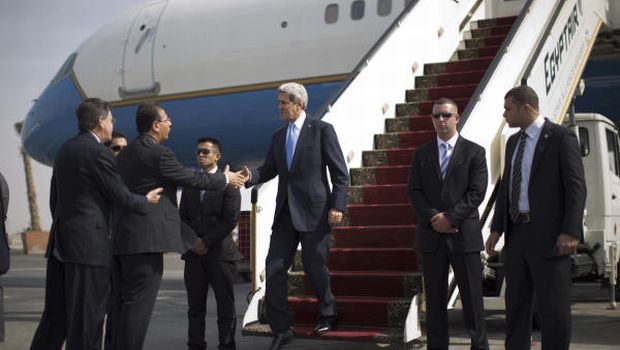The Egyptian military’s removal of Mohamed Mursi in July followed by a harsh crackdown on his protesting supporters led the US to suspend hundreds of millions of dollars in aid.
The State Department apparently expected a frosty reception for Kerry, especially with tensions running high on the eve of Monday’s scheduled start of Mursi’s trial on charges of inciting murder. The department refused to confirm Kerry’s visit until he landed in Cairo, even though Egypt’s official news agency reported the impending trip three days earlier.
The secrecy was unprecedented for a secretary of state’s travel to Egypt, for decades one of the closest US allies in the Arab world, and highlighted the deep rifts today between Washington and Cairo.
Kerry last was in Egypt in March, when he urged Mursi and his Muslim Brotherhood-backed government to enact sweeping economic reforms and govern in a more inclusive manner. Those calls went unheeded.
Egypt’s foreign minister, Nabil Fahmy, said last month that US–Egyptian relations were in “turmoil” and warned that the strain could affect the entire Middle East.
With US influence ebbing, Kerry’s message about the importance of economic and constitutional reforms was expected to be met with suspicion, if not outright hostility, by Egyptian leaders and a population deeply mistrustful of Washington’s motives. Many Egyptians accuse the Obama Administration of taking sides in their domestic political turmoil; American officials adamantly deny it.
Kerry began his Cairo day stop with a meeting with Fahmy. Later, he is to see Egypt’s Army chief, Gen. Abdel-Fattah El-Sisi, interim president Adly Mansour, and civic leaders. Kerry intended to underscore the necessity of democratic transition through a transparent and inclusive constitutional process, and free and fair parliamentary and presidential elections.
Only once progress is made on those, American officials say, will the US consider restoring the suspended aid. They say Kerry is eager to assure Egyptians that the US considers Egypt an important friend and bulwark of regional stability, notably because of its peace treaty with Israel.
An initial administration attempt at outreach to post-Mursi Egypt—providing USD 60 million to spur private investment in Egypt’s flailing economy—has been held up in Congress.
US officials traveling with Kerry said he also would stress the importance of human rights, particularly freedom of the press and assembly, and the role of civil society in ensuring a pluralistic society.
Also, Mursi’s trial was set to begin Monday, a day after Kerry’s scheduled departure.
Mursi supporters planned widespread protests on the day of the trial. Security concerns were so high that the venue for the trial was not yet formally announced. It was expected to be held in a heavily secured police academy in Cairo.
US officials said the timing of the trial and Kerry’s visit were purely coincidental, but that Kerry was likely to impress on his hosts the importance of due process and transparency in all judicial proceedings.
Egypt was Kerry’s first stop on a nine-day tour of the Middle East and Europe. The trip is widely seen as a damage control mission to ease disagreements between the US and its friends over Syria, Iran and the revelations of widespread US surveillance activities around the globe.
From Egypt, Kerry planned to travel to Saudi Arabia, Poland, Israel, the Palestinian Authority, Jordan, the United Arab Emirates, Algeria and Morocco.

